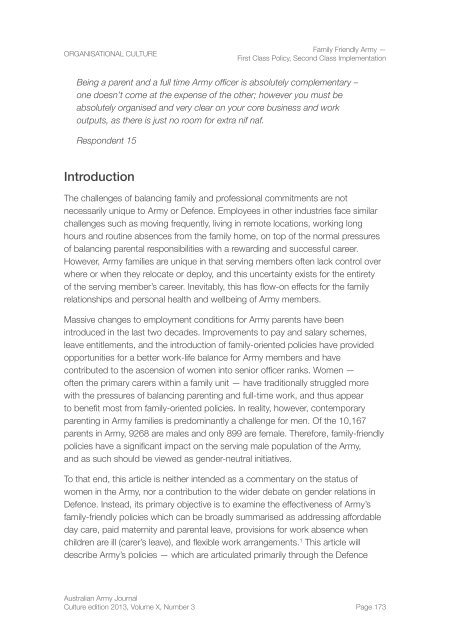Australian Army Journal
Australian Army Journal
Australian Army Journal
You also want an ePaper? Increase the reach of your titles
YUMPU automatically turns print PDFs into web optimized ePapers that Google loves.
ORGANISATIONAL CULTURE<br />
Family Friendly <strong>Army</strong> —<br />
First Class Policy, Second Class Implementation<br />
Being a parent and a full time <strong>Army</strong> officer is absolutely complementary –<br />
one doesn’t come at the expense of the other; however you must be<br />
absolutely organised and very clear on your core business and work<br />
outputs, as there is just no room for extra nif naf.<br />
Respondent 15<br />
Introduction<br />
The challenges of balancing family and professional commitments are not<br />
necessarily unique to <strong>Army</strong> or Defence. Employees in other industries face similar<br />
challenges such as moving frequently, living in remote locations, working long<br />
hours and routine absences from the family home, on top of the normal pressures<br />
of balancing parental responsibilities with a rewarding and successful career.<br />
However, <strong>Army</strong> families are unique in that serving members often lack control over<br />
where or when they relocate or deploy, and this uncertainty exists for the entirety<br />
of the serving member’s career. Inevitably, this has flow-on effects for the family<br />
relationships and personal health and wellbeing of <strong>Army</strong> members.<br />
Massive changes to employment conditions for <strong>Army</strong> parents have been<br />
introduced in the last two decades. Improvements to pay and salary schemes,<br />
leave entitlements, and the introduction of family-oriented policies have provided<br />
opportunities for a better work-life balance for <strong>Army</strong> members and have<br />
contributed to the ascension of women into senior officer ranks. Women —<br />
often the primary carers within a family unit — have traditionally struggled more<br />
with the pressures of balancing parenting and full-time work, and thus appear<br />
to benefit most from family-oriented policies. In reality, however, contemporary<br />
parenting in <strong>Army</strong> families is predominantly a challenge for men. Of the 10,167<br />
parents in <strong>Army</strong>, 9268 are males and only 899 are female. Therefore, family-friendly<br />
policies have a significant impact on the serving male population of the <strong>Army</strong>,<br />
and as such should be viewed as gender-neutral initiatives.<br />
To that end, this article is neither intended as a commentary on the status of<br />
women in the <strong>Army</strong>, nor a contribution to the wider debate on gender relations in<br />
Defence. Instead, its primary objective is to examine the effectiveness of <strong>Army</strong>’s<br />
family-friendly policies which can be broadly summarised as addressing affordable<br />
day care, paid maternity and parental leave, provisions for work absence when<br />
children are ill (carer’s leave), and flexible work arrangements. 1 This article will<br />
describe <strong>Army</strong>’s policies — which are articulated primarily through the Defence<br />
<strong>Australian</strong> <strong>Army</strong> <strong>Journal</strong><br />
Culture edition 2013, Volume X, Number 3 Page 173

















